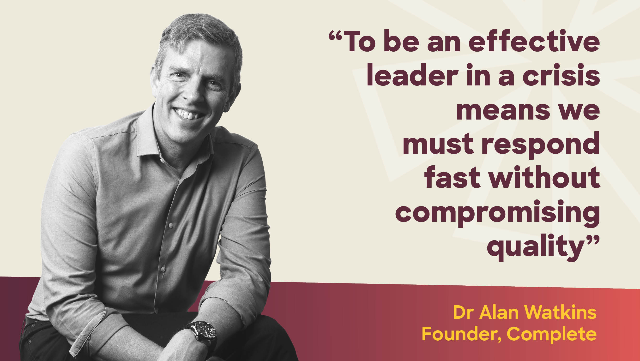We must develop the emotional skills to survive and lead through any disruption, writes physician and neuroscientist Dr Alan Watkins, CEO of Complete.
When Covid-19 emerged in Wuhan in December 2019, and then ripped through the local population in China in January 2020, did other nations respond quickly enough? How many upscaled their testing capability and ordered protective equipment in time to meet the escalating needs of frontline staff?; how quickly did they upscale their ventilation capacity?
Most leaders would probably admit they did not move fast enough. In fairness, some of the delays were because the tests, face masks and ventilators had to be tested. To be an effective leader in a crisis means we must respond fast without compromising quality.
Effective skills for now
The same principles are true for a leader’s response to the panic, fear and anxiety that has been sweeping the world. When so many people are frightened for their own lives and livelihoods and those of family and friends, we need mental health strategies that really work – and work quickly.
We don’t have the time or freedom to attend a yoga retreat, an eight-week meditation class, a programme in mindfulness. We don’t have instant access to effective cognitive behavioural therapy.
All these things may be useful but, in the crisis, do they really help most of the population? What we need are effective skills that can change lives, reduce risks and improve mental health today, not in a few weeks’ time.
This isn’t a mental health issue
These skills are not mental skills because the problem isn’t ‘mental’, it’s emotional. And the problem isn’t a ‘health’ issue, at least in the short term, it’s a development issue.
In most cases of anxiety or panic, cognition or thinking (the ‘mental’ bit) is normal. The real problem is much deeper, and it stems from our inability to regulate our emotions. People who suffer with anxiety, panic or many other unhelpful emotional states are unable to turn on, and sustain, more positive emotional states.
Being unable to switch on a more productive emotion, such as optimism, appreciation or even compassion, means we can easily become stuck in a ‘world’ of negative emotions. If people stay stuck on the ‘planet’ of fear for too long, they start to believe that this is who they are.
Anxiety, depression or fear becomes an identity issue. Hence, people say “I am depressed” or “I am anxious”. Depression is not who they are. Depression is merely the ‘planet’ they are stuck on and they need to develop the ability to switch to a more helpful emotional planet.
How you feel reduces the risk of ill-health
The science behind this is compelling, particularly now when we are faced with a virus such as Covid-19. When we generate negative emotions, we generate a hormone called cortisol which impairs our immune system and renders us more susceptible to infection.
Positive emotions generate a different hormone (DHEA) which boosts performance and the immune system. Put simply, changing how you feel reduces the risk of ill-health.
What will work right now is helping people to change their emotional state. This doesn’t require a long course or a retreat. It just requires people to practise, and get good at, changing their emotional state. Failure to do so is a failure of development not a failure of the person. Most of us just haven’t been taught how to do this.
Access Complete's free webinars, podcasts, articles and virtual services to support leaders during the coronavirus crisis.
If your organisation could benefit from levy-funded virtual learning, discover our Transformational Leadership Programme and up-skill your future leaders today.
















